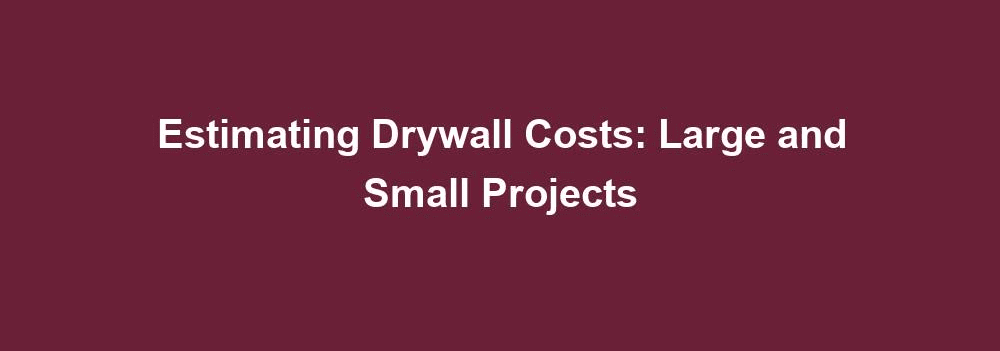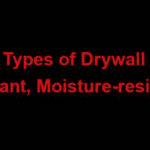When it comes to drywall projects, estimating the cost is crucial for making informed decisions and ensuring a fair deal. This article delves into two distinct methods for estimating the cost of drywall installation, catering to both large and small projects. Whether you’re planning a major home renovation or a minor patch-up, having a clear understanding of the costs involved is essential to make sound choices.
Estimating the Cost of Large Drywall Projects
Large drywall projects typically entail projects that require more than 75 sheets of drywall. Here, we’ll discuss how to estimate the cost of such substantial undertakings.
Determining Square Footage of Drywall Needed
To estimate the cost of a large residential construction project, contractors typically start by determining the total number of sheets of drywall required. They may accomplish this by walking through each room or using blueprints to virtually measure the project. The key is to calculate the total square footage of the area to be covered with drywall.
Let’s take an example: You have a room that is 12 feet wide, 16 feet long, and has 9-foot-tall ceilings. To calculate the drywall needed, you’d compute as follows:
Two 12-foot-long walls: 2 * 12 ft * 9 ft = 216 sq ft each
Two 16-foot-long walls: 2 * 16 ft * 9 ft = 288 sq ft each
Ceiling: 16 ft * 12 ft = 192 sq ft
So, for this room, you would need approximately 444 sq ft of drywall.
Including Openings for Windows and Doors
When measuring surfaces, it’s advisable to include areas for windows and doors in the total sheet count. While these openings won’t be covered with drywall, you’ll need to purchase nearly the same amount of drywall material. Moreover, the additional labor required for these areas should also be factored into the overall cost estimate.
Calculating Costs
Once you’ve determined the total square footage of drywall needed, you can multiply it by a contractor’s square footage rate. This calculation encompasses both material and labor costs. For example, if your project requires 150 sheets of 4-foot x 12-foot drywall, equaling 7,200 sq ft, and the contractor charges $1.30 per sq ft for labor and materials, you can estimate the project cost at around $9,360.
Material Costs: Material costs usually range between 45 to 60 cents per sq ft, covering the drywall itself, fasteners, glue, and miscellaneous supplies. It may or may not include finishing materials.
Labor Costs: Labor costs vary widely depending on the company’s structure, overhead, and skill level of employees. Labor prices for hanging and taping drywall can range from 60 cents to 120 cents per sq ft. Projects with unique features, high ceilings, or intricate designs may cost more.
Please note that these figures are general guidelines, and actual costs may vary based on local factors and individual contractors’ pricing strategies.
Estimating the Cost of Small Drywall Projects
Small drywall jobs encompass one-room residential renovations, simple patches, repairs, or smaller kitchen and bathroom remodels. Estimating costs for these projects follows a different approach.
Determining Material Needs
For small jobs, contractors will first assess how much material is needed and estimate material costs. This process is similar to that used for large projects.
However, for small projects where only a few sheets are required, labor costs are often calculated differently. Contractors will estimate the number of days or man-hours needed to complete the project based on their experience.
Calculating Labor Costs
Let’s illustrate this with an example: If a project necessitates only 17 sheets of 4-foot x 12-foot drywall, equivalent to about 816 sq ft, and the contractor charges $1.30 per sq ft, the labor cost alone may not be sufficient to complete the job. A project of this scale may require at least three days of labor for hanging, taping, and texturing, which will result in higher labor expenses.
The key takeaway is that small remodel jobs are often quoted at a higher per sq ft rate compared to larger projects, as each journeyman tradesman expects to earn a certain daily wage.
Seeking Multiple Quotes
In all cases, it’s advisable to gather quotes from various contractors. This helps you understand local market rates, uncover hidden details, and assess a company’s approach. When comparing quotes, remember that the cheapest option may not always guarantee the best outcome. Reputation, reliability, and quality of the finished product are equally crucial considerations.
Wrapping Up
To summarize, drywall costs typically range from 105 to 180 cents per sq ft for both material and labor. However, costs can vary based on factors such as project complexity, ceiling height, and regional variations. For small projects with less than 75 sheets, labor costs often dominate the overall cost, with journeyman workers expecting to earn between $200 and $300 per day.
It’s essential to understand that these guidelines provide a general overview of estimating drywall costs. Actual pricing may vary based on the contractor’s specific methods and local factors. When planning your drywall project, seeking quotes from reliable contractors is crucial to ensure a successful and cost-effective outcome.
tag: # Estimating Drywall Costs







